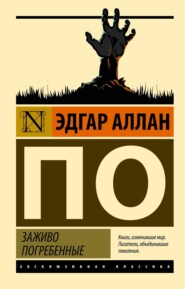По всем вопросам обращайтесь на: info@litportal.ru
(©) 2003-2024.
✖
Tales of Mystery and Imagination
Автор
Год написания книги
2019
Настройки чтения
Размер шрифта
Высота строк
Поля
While he spoke thus, I commenced the passes which I had already found most effectual in subduing him. He was evidently influenced with the first lateral stroke of my hand across his forehead; but although I exerted all my powers, no further perceptible effect was induced until some minutes after ten o’clock, when Doctors D—and F—called, according to appointment. I explained to them, in a few words, what I designed, and as they opposed no objection, saying that the patient was already in the death agony, I proceeded without hesitation—exchanging, however, the lateral passes for downward ones, and directing my gaze entirely into the right eye of the sufferer.
By this time his pulse was imperceptible and his breathing was stertorous, and at intervals of half a minute.
This condition was nearly unaltered for a quarter of an hour. At the expiration of this period, however, a natural although a very deep sigh escaped the bosom of the dying man, and the stertorous breathing ceased—that is to say, its stertorousness was no longer apparent; the intervals were undiminished. The patient’s extremities were of an icy coldness.
At five minutes before eleven I perceived unequivocal signs of the mesmeric influence. The glassy roll of the eye was changed for that expression of uneasy inward examination which is never seen except in cases of sleep-waking, and which it is quite impossible to mistake. With a few rapid lateral passes I made the lids quiver, as in incipient sleep, and with a few more I closed them altogether. I was not satisfied, however, with this, but continued the manipulations vigorously, and with the fullest exertion of the will until I had completely stiffened the limbs of the slumberer, after placing them in a seemingly easy position. The legs were at full length; the arms were nearly so, and reposed on the bed at a moderate distance from the loins. The head was very slightly elevated.
When I had accomplished this it was fully midnight, and I requested the gentlemen present to examine M. Valdemar’s condition. After a few experiments, they admitted him to be in an unusually perfect state of mesmeric trance. The curiosity of both the physicians was greatly excited. Dr D—resolved at once to remain with the patient all night, while Dr F—took leave with a promise to return at daybreak. Mr L—I and the nurses remained.
We left M. Valdemar entirely undisturbed until, about three o’clock in the morning, when I approached him and found him in precisely the same condition as when Dr F—went away—that is to say, he lay in the same position; the pulse was imperceptible; the breathing was gentle (scarcely noticeable, unless through the application of a mirror to the lips); the eyes were closed naturally; and the limbs were as rigid and as cold as marble. Still, the general appearance was certainly not that of death.
As I approached M. Valdemar I made a kind of half effort to influence his right arm into pursuit of my own, as I passed the latter gently to and fro above his person. In such experiments with this patient I had never perfectly succeeded before, and assuredly I had little thought of succeeding now; but to my astonishment his arm very readily, although feebly, followed every direction I assigned it with mine. I determined to hazard a few words of conversation.
‘M. Valdemar,’ I said, ‘are you asleep?’ He made no answer, but I perceived a tremor about the lips, and was thus induced to repeat the question again and again. At its third repetition, his whole frame was agitated by a very slight shivering; the eyelids unclosed themselves so far as to display a white line of a ball; the lips moved sluggishly, and from between them, in a barely audible whisper, issued the words:—
‘Yes; asleep now. Do not wake me!—let me die so!’
I here felt the limbs and found them rigid as ever. The right arm, as before, obeyed the direction of my hand. I questioned the sleep-waker again:—
‘Do you still feel pain in the breast, M. Valdemar?’
The answer now was immediate, but even less audible than before:—
‘No pain—I am dying.’
I did not think it advisable to disturb him further just then, and nothing more was said or done until the arrival of Dr F—, who came a little before sunrise, and expressed unbounded astonishment at finding the patient still alive. After feeling the pulse and applying a mirror to the lips, he requested me to speak to the sleep-waker again. I did so, saying:—
‘M. Valdemar, do you still sleep?’
As before, some minutes elapsed ere a reply was made; and during the interval the dying man seemed to be collecting his energies to speak. At my fourth repetition of the question, he said very faintly, almost inaudibly:—
‘Yes; still asleep—dying.’
It was now the opinion, or rather the wish, of the physicians, that M. Valdemar should be suffered to remain undisturbed in his present apparently tranquil condition, until death should supervene; and this, it was generally agreed, must now take place within a few minutes. I concluded, however, to speak to him once more, and merely repeated my previous question.
While I spoke, there came a marked change over the countenance of the sleep-waker. The eyes rolled themselves slowly open, the pupils disappearing upwardly; the skin generally assumed a cadaverous hue, resembling not so much parchment as white paper; and the circular hectic spots which, hitherto, had been strongly defined in the centre of each cheek, went out at once. I use this expression, because the suddenness of their departure put me in mind of nothing so much as the extinguishment of a candle by a puff of the breath. The upper lip, at the same time, writhed itself away from the teeth, which it had previously covered completely; while the lower jaw fell with an audible jerk, leaving the mouth widely extended, and disclosing in full view the swollen and blackened tongue. I presume that no member of the party then present had been unaccustomed to death-bed horrors; but so hideous beyond conception was the appearance of M. Valdemar at this moment, that there was a general shrinking back from the region of the bed.
I now feel that I have reached a point of this narrative at which every reader will be startled into positive disbelief. It is my business, however, simply to proceed.
There was no longer the faintest sign of vitality in M. Valdemar; and, concluding him to be dead, we were consigning him to the charge of the nurses, when a strong vibratory motion was observable in the tongue. This continued for perhaps a minute. At the expiration of this period, there issued from the distended and motionless jaws a voice—such as it would be madness in me to attempt describing. There are, indeed, two or three epithets which might be considered as applicable to it in parts. I might say, for example, that the sound was harsh, and broken, and hollow; but the hideous whole is indescribable, for the simple reason that no similar sounds have ever jarred upon the ear of humanity. There were two particulars, nevertheless, which I thought then, and still think, might fairly be stated as characteristic of the intonation—as well adapted to convey some idea of its unearthly peculiarity. In the first place, the voice seemed to reach our ears—at least mine—from a vast distance, or from some deep cavern within the earth. In the second place, it impressed me (I fear, indeed, that it will be impossible to make myself comprehended) as gelatinous or glutinous matters impress the sense of touch.
I have spoken both of ‘sound’ and of ‘voice.’ I mean to say that the sound was one of distinct—of even wonderfully, thrillingly distinct—syllabification. M. Valdemar spoke—obviously in reply to the question I had propounded to him a few minutes before. I had asked him, it will be remembered, if he still slept. He now said:—
‘Yes—no—I have been sleeping—and now—now—I am dead.’
No person present even effected to deny, or attempted to repress, the unutterable, shuddering horror which these few words, thus uttered, were so well calculated to convey. Mr L—I (the student) swooned. The nurses immediately left the chamber, and could not be induced to return. My own impressions I would not pretend to render intelligible to the reader. For nearly an hour, we busied ourselves, silently—without the utterance of a word—in endeavours to revive Mr L—I. When he came to himself, we addressed ourselves again to an investigation of M. Valdemar’s condition.
It remained in all respects as I have last described it, with the exception that the mirror no longer afforded evidence of respiration. An attempt to draw blood from the arm failed. I should mention, too, that this limb was no further subject to my will. I endeavoured in vain to make it follow the direction of my hand The only real indication, indeed, of the mesmeric influence, was now found in the vibratory movement of the tongue, whenever I addressed M. Valdemar a question. He seemed to be making an effort to reply, but had no longer sufficient volition. To queries put to him by any other person than myself he seemed utterly insensible—although I endeavoured to place each member of the company in mesmeric rapport with him. I believe that I have now related all that is necessary to an understanding of the sleep-waker’s state at this epoch. Other nurses were procured; and at ten o’clock I left the house in company with the two physicians and Mr L—I.
In the afternoon we all called again to see the patient. His condition remained precisely the same. We had now some discussion as to the propriety and feasibility of awakening him; but we had little difficulty in agreeing that no good purpose would be served by so doing. It was evident that, so far, death (or what is usually termed death) had been arrested by the mesmeric process. It seemed clear to us all that to awaken M. Valdemar would be merely to ensure his instant, or at least his speedy dissolution.
From this period until the close of last week—an interval of nearly seven months—we continued to make daily calls at M. Valdemar’s house, accompanied, now and then, by medical and other friends. All this time the sleep-waker remained exactly as I have last described him. The nurses’ attentions were continual.
It was on Friday last that we finally resolved to make the experiment of awakening, or attempting to awaken him; and it is the (perhaps) unfortunate result of this latter experiment which has given rise to so much discussion in private circles—to so much of what I cannot help thinking unwarranted popular feeling.
For the purpose of relieving M. Valdemar from the mesmeric trance, I made use of the customary passes. These, for a time, were unsuccessful. The first indication of revival was afforded by a partial descent of the iris. It was observed, as especially remarkable, that this lowering of the pupil was accompanied by the profuse outflowing of a yellowish ichor (from beneath the lids) of a pungent and highly offensive odour.
It was now suggested that I should attempt to influence the patient’s arm, as heretofore. I made the attempt and failed. Dr F—then intimated a desire to have me put a question. I did so, as follows:—
‘M. Valdemar, can you explain to us what are your feelings or wishes now?’
There was an instant return of the hectic circles on the cheeks; the tongue quivered, or rather rolled violently in the mouth (although the jaws and lips remained rigid as before); and at length the same hideous voice which I have already described, broke forth:—
‘For God’s sake!—quick!—quick!—put me to sleep—or, quick!—waken me!—quick!—I say to you that I am dead!’
I was thoroughly unnerved, and for an instant remained undecided what to do. At first I made an endeavour to re-compose the patient; but, failing in this through total abeyance of the will, I retraced my steps and as earnestly struggled to awaken him. In this attempt I soon saw that I should be successful—or at least I soon fancied that my success would be complete—and I am sure that all in the room were prepared to see the patient awaken.
For what really occurred, however, it is quite impossible that any human being could have been prepared.
As I rapidly made the mesmeric passes, amid ejaculations of ‘dead! dead!’ absolutely bursting from the tongue and not from the lips of the sufferer, his whole frame at once—within the space of a single minute, or even less, shrunk—crumbled—absolutely rotted away beneath my hands. Upon the bed, before that whole company, there lay a nearly liquid mass of loathsome—of detestable putridity.
CHAPTER 4 MS. Found in a Bottle (#ulink_3ae8797d-deaa-541a-8e00-2b298e5b9f39)
Qui n’a plus qu’un moment à vivre
N’a plus rien à dissimuler.
—Quinault, Atys.
Of my country and of my family I have little to say. Ill usage and length of years have driven me from the one, and estranged me from the other. Hereditary wealth afforded me an education of no common order, and a contemplative turn of mind enabled me to methodise the stores which early study diligently garnered up. Beyond all things, the works of the German moralists gave me great delight; not from my ill-advised admiration of their eloquent madness, but from the ease with which my habits of rigid thoughts enabled me to detect their falsities. I have often been reproached with the aridity of my genius; a deficiency of imagination has been imputed to me as a crime; and the Pyrrhonism of my opinions has at all times rendered me notorious. Indeed, a strong relish for physical philosophy has, I fear, tinctured my mind with a very common error of this age—I mean the habit of referring occurrences, even the least susceptible of such reference, to the principles of that science. Upon the whole, no person could be less liable than myself to be led away from the severe precincts of truth by the ignes fatui of superstition. I have thought proper to premise this much, lest the incredible tale I have to tell should be considered rather the raving of a crude imagination, than the positive experience of a mind to which the reveries of fancy have been a dead letter and a nullity.
After many years spent in foreign travel, I sailed in the year 18—, from the port of Batavia, in the rich and populous island of Java, on a voyage to the Archipelago of the Sunda Islands. I went as passenger—having no other inducement than a kind of nervous restlessness which haunted me as a fiend.
Our vessel was a beautiful ship of about four hundred tons, copper-fastened, and built at Bombay of Malabar teak. She was freighted with cotton-wool and oil, from the Laccadive Islands. We had also on board coir, jaggeree, ghee, cocoa-nuts, and a few cases of opium. The stowage was clumsily done, and the vessel consequently crank.
We got under way with a mere breath of wind, and for many days stood along the eastern coast of Java, without any other incident to beguile the monotony of our course than the occasional meeting with some of the small grabs of the Archipelago to which we were bound.
One evening, leaning over the taffrail, I observed a very singular isolated cloud, to the NW. It was remarkable, as well from its colour as from its being the first we had seen since our departure from Batavia. I watched it attentively until sunset, when it spread all at once to the eastward and westward, girting in the horizon with a narrow strip of vapour, and looking like a long line of low beach. My notice was soon afterward attracted by the dusky-red appearance of the moon, and the peculiar character of the sea. The latter was undergoing a rapid change, and the water seemed to be more than usually transparent. Although I could distinctly see the bottom, yet, heaving the lead, I found the ship in fifteen fathoms. The air now became intolerably hot, and was loaded with spiral exhalations similar to those arising from heated iron. As night came on, every breath of wind died away, and a more entire calm it is impossible to conceive. The flame of a candle burned upon the poop without the least perceptible motion, and a long hair, held between the finger and thumb, hung without the possibility of detecting a vibration. However, as the captain said he could perceive no indication of danger, and as we were drifting in bodily to shore, he ordered the sails to be furled, and the anchor let go. No watch was set, and the crew, consisting principally of Malays, stretched themselves deliberately upon deck. I went below—not without a full presentiment of evil. Indeed, every appearance warranted me in apprehending a simoom. I told the captain of my fears; but he paid no attention to what I said, and left me without deigning to give a reply. My uneasiness, however, prevented me from sleeping, and about midnight I went upon deck. As I placed my foot upon the upper step of the companion-ladder, I was startled by a loud, humming noise, like that occasioned by the rapid revolution of a mill-wheel, and before I could ascertain its meaning, I found the ship quivering to its centre. In the next instant, a wilderness of foam hurled us upon our beam-ends, and, rushing over us fore and aft, swept the entire decks from stem to stern.
The extreme fury of the blast proved, in a great measure, the salvation of the ship. Although completely water-logged, yet, as her masts had gone by the board, she rose, after a minute, heavily from the sea, and, staggering awhile beneath the immense pressure of the tempest, finally righted.
By what miracle I escaped destruction it is impossible to say. Stunned by the shock of the water, I found myself, upon recovery, jammed in between the stern-post and rudder. With great difficulty I regained my feet, and looking dizzily around, was at first struck with the idea of our being among breakers; so terrific, beyond the wildest imagination, was the whirlpool of mountainous and foaming ocean within which we were engulfed. After a while I heard the voice of an old Swede, who had shipped with us at the moment of leaving port. I halloed to him with all my strength, and presently he came reeling aft. We soon discovered that we were the sole survivors of the accident. All on deck, with the exception of ourselves, had been swept overboard; the captain and mates must have perished while they slept, for the cabins were deluged with water. Without assistance we could expect to do little for the security of the ship, and our exertions were at first paralysed by the momentary expectation of going down. Our cable had, of course, parted like pack-thread, at the first breath of the hurricane, or we should have been instantaneously overwhelmed. We scudded with frightful velocity before the sea, and the water made clear breaches over us. The framework of our stern was shattered excessively, and, in almost every respect, we had received considerable injury; but to our extreme joy we found the pumps unchoked, and that we had made no great shifting of our ballast. The main fury of the blast had already blown over, and we apprehended little danger from the violence of the wind; but we looked forward to its total cessation with dismay; well believing that in our shattered condition, we should inevitably perish in the tremendous swell which would ensue. But this very just apprehension seemed by no means likely to be soon verified. For five entire days and nights—during which our only substance was a small quantity of jaggeree, procured with great difficulty from the forecastle—the hulk flew at a rate defying computation, before rapidly succeeding flaws of wind, which, without equalling the first violence of the simoom, were still more terrific than any tempest I had before encountered. Our course for the first four days was, with trifling variations, SE and by S.; and we must have run down the coast of New Holland. On the fifth day the cold became extreme, although the wind had hauled round a point more to the northward. The sun rose with a sickly yellow lustre, and clambered a very few degrees above the horizon—emitting no decisive light. There were no clouds apparent, yet the wind was upon the increase, and blew with a fitful and unsteady fury. About noon, as nearly as we could guess, our attention was again arrested by the appearance of the sun. It gave out no light properly so called, but a dull and sullen glow without reflection, as if all its rays were polarised. Just before sinking within the turgid sea, its central fires suddenly went out, as if hurriedly extinguished by some unaccountable power. It was a dim, silver-like rim, alone, as it rushed down the unfathomable ocean.
We waited in vain for the arrival of the sixth day—that day to me has not yet arrived—to the Swede never did arrive. Thenceforward we were enshrouded in pitchy darkness, so that we could not have seen an object at twenty paces from the ship. Eternal night continued to envelop us, all unrelieved by the phosphoric sea-brilliancy to which we had been accustomed in the tropics. We observed, too, that, although the tempest continued to rage with unabated violence, there was no longer to be discovered the usual appearance of surf, or foam, which had hitherto attended us. All around were horror, and thick gloom, and a black sweltering desert of ebony. Superstitious terror crept by degrees into the spirit of the old Swede, and my own soul was wrapped in silent wonder. We neglected all care of the ship, as worse than useless, and securing ourselves as well as possible, to the stump of the mizzen-mast, looked out bitterly into the world of ocean. We had no means of calculating time, nor could we form any guess of our situation. We were, however, well aware of having made farther to the southward than any previous navigators, and felt great amazement at not meeting with the usual impediments of ice. In the meantime every moment threatened to be our last—every mountainous billow hurried to overwhelm us. The swell surpassed anything I had imagined possible, and that we were not instantly buried is a miracle. My companion spoke of the lightness of our cargo, and reminded me of the excellent qualities of our ship; but I could not help feeling the utter hopelessness of hope itself, and prepared myself gloomily for that death which I thought nothing could defer beyond an hour, as, with every knot of way the ship made, the swelling of the black stupendous seas became more dismally appalling. At times we gasped for breath at an elevation beyond the albatross—at times became dizzy with the velocity of our descent into some watery hell, where the air grew stagnant, and no sound disturbed the slumbers of the kraken.
We were at the bottom of one of these abysses, when a quick scream from my companion broke fearfully upon the night. ‘See! see!’ cried he, shrieking in my ears, ‘Almighty God! see! see!’ As he spoke I became aware of a dull sullen glare of red light which streamed down the sides of the vast chasm where we lay, and threw a fitful brilliancy upon our deck. Casting my eyes upwards, I beheld a spectacle which froze the current of my blood. At a terrific height, directly above us, and upon the very verge of the precipitous descent, hovered a gigantic ship, of perhaps four thousand tons. Although upreared upon the summit of a wave more than a hundred times her own altitude, her apparent size still exceeded that of any ship of the line or East-Indiaman in existence. Her huge hull was of a deep dingy black, unrelieved by any of the customary carvings of a ship. A single row of brass cannon protruded from her open ports, and dashed from the polished surfaces the fires of innumerable battle-lanterns which swung to and fro about her rigging. But what mainly inspired us with horror and astonishment, was that she bore up under a press of sail in the very teeth of that supernatural sea, and of that ungovernable hurricane. When we first discovered her, her bows were alone to be seen, as she rose slowly from the dim and horrible gulf beyond her. For a moment of intense terror she paused upon the giddy pinnacle as if in contemplation of her own sublimity, then trembled, and tottered, and—came down.
At this instant, I know not what sudden self-possession came over my spirit. Staggering as far aft as I could, I awaited fearlessly the ruin that was to overwhelm. Our own vessel was at length ceasing from her struggles, and sinking with her head to the sea. The shock of the descending mass struck her, consequently, in that portion of her frame which was nearly under water, and the inevitable result was to hurl me, with irresistible violence, upon the rigging of the stranger.

















